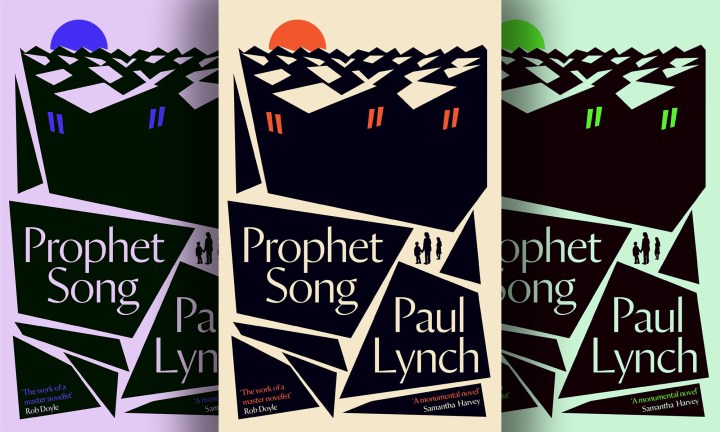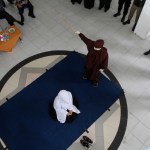BOOK REVIEW
Delving into the 2023 winner of the Booker Prize, ‘Prophet Song’

Warning: Fascism is bad for your life.
“I found myself working on a dead-end novel for six months and then I had an idea. I could not write about Syria because I did not know enough about it. Instead, I could move the mountain to Ireland and co-opt the problem in spirit. Prophet Song was born, and setting my tale in Dublin was the great liberation. I began to wonder what Ireland would look like with a populist government drifting towards tyranny.” Paul Lynch, How should literature meet the world we live in now? (2023)
The 2023 winner of the Booker Prize is Irish writer Paul Lynch’s novel, Prophet Song. It’s a story for our time and for all times. It’s a story of family, love and war set in Dublin, Ireland, propped up by the unique geography of that city. But it’s also a story of what has been and what could be in many other countries. Indeed, Prophet Song is the dark possibility that lurks in every country — including ours.
Ireland’s capital Dublin has spawned a long literary tradition; it’s a city marked and mapped by its writers and in turn scarred by the imprints they have left on its psyche: James Joyce, Samuel Beckett, WB Yeats; a city not unfamiliar with political trauma, from the 1916 Easter Uprising through a century of sorrows and joys. Its most recent manifestation came with a night of orgiastic violence that shook Dublin in November 2023.
And yet Prophet Song depicts a more modern trauma, the type that comes with populism, power and access to the technologies of modern warfare.
In 2023 the Booker judges have done well to select a novel of now, and thereby guarantee it a mass and global readership.
In this defining year for democracy — there are more than 50 elections with several countries on the precipice of populism including the US and South Africa — people need to be assisted to think about the consequences of who they elect. But even if it wasn’t so of the now, the poetry of its prose makes it a worthy winner.
A family in freefall
It’s a relatively simple story about complex forces that befall society, sweeping up people, unleashing and simultaneously constraining free will. It’s the story of an ordinary Dublin family, the Stacks (Larry, Ailish, Mark, Molly, Bailey, Ben and Molly’s dad, Simon) living in an ordinary suburb, caught up in incremental but nonetheless inexorable slide of a country into populism, totalitarianism, fascism — call it what you will.
It’s a political novel whose author eschews writing ‘political’ novels.
But its politics is exterior to the human story, it’s literally the story’s shrapnel. Instead of being centred in the novel politics is the effect of intimate consequence: seen and felt through the eyes, instincts and fleeting observations of a middle-aged middle-class everywoman, Ailish Stack, as she tries to preserve the safety and sanity of her family after her trade unionist husband, Larry, is abducted by the Gardai National Services Bureau (GNSB), Ireland’s new secret police.
One irony reflected in the novel is that the people who make political decisions and run the state are largely exempted from the personal consequences of their decisions. Not so ordinary people. French novelist Edouard Louis puts it this way:
“ … political decisions everywhere in Denmark, in Sweden, in France, in the US everywhere particularly for dominated people are part of your physical and intimate history. It is as intimate as the first time you kiss someone. … when we talk about politics we often talk about exclusion but most of the time it is when you have privilege you can exclude yourself from politics but when you have nothing you are completely subjected to politics.”
As we are carried across the 300 pages of Prophet Song we fly-on-the-wall the travails of the Stack family as Dublin slides from authoritarianism to a fleeting people’s rebellion, to its crushing, to civil war and destruction. At one point Ailish’s teenage daughter Molly frames it likes this:
“They are calling it an insurgency on international news, … , but if you want to give war its proper name, call it entertainment, we are now TV for the rest of the world.”
Gaza. Khartoum. Aleppo. Sounds familiar?
Later on in the book, after being advised by a friend that she should consider Larry, her husband, to be dead, Ailish dislodges a profound thought that connects the grief she is postponing with grievance and hope…
“It is then that she is met with the feeling that Larry is beside her, she turns to look and meet her grief, she is balling her hands and shaking them, telling herself over and over that what Carole said cannot be true, nobody knows what is true anymore, telling herself that what she feels isn’t grief, it has to be something else, grievance is grief dressed in the clothes of hope. She must escape down the hatch into daylight …”
But then the narrative hurries on. Real life, particularly in conflict, doesn’t allow the luxury of deep introspection.
Prophet Song is composed of a river-like flow of words, the rhythm of life captured in minute observations of family and war, but always pushing onwards (as time does). The book lacks self-awareness, reflecting the author’s determination to excavate a story but avoid disruptive commentary on the politics it brings to life — in interviews he often talks about “the book” as if it is an almost independent being — making profound political comments and then moving on without dwelling on them.
Read more in Daily Maverick: Art, beauty, death: Reflections on Nick Cave’s new book
End of the world
As the story unfolded, I often wondered where its title was drawn from.
I found it late in the book in a rare authorial cri de coeur from Lynch, a cry you feel arises from his musings on Syria, Dublin and now, you might add, Gaza:
“… and the prophet sings not of the end of the world but of what has been done and what will be done and what is being done to some but not others, that the world is always ending over and over again in one place, but not another and that the end of the world is always a local event, it comes to your country and visits your town and knocks on the door of your house and becomes to others but some distant warning, a brief report on the news, an echo of events that has passed into folklore.”
Shortly after this passage, the book leaves you and the remains of the Stack family, beached before the next stage of what you sense could be the endless flight of another refugee family; there may be a happy-ish ending, or there may be further trauma and loss. That’s life.
Thinking about Prophet Song, its setting and author, led me to a poem ‘In Memory of WB Yeats’ in which WH Auden writes of Yeats:
“Mad Ireland hurt you into poetry.
Now Ireland has her madness and her weather still,
For poetry makes nothing happen: it survives
In the valley of its making where executives
Would never want to tamper, flows on south
From ranches of isolation and the busy griefs,
Raw towns that we believe and die in; it survives,
A way of happening, a mouth.”
Warning: Prophet Song is harrowing.
It slowly lulls you into the lives and rhythms of the Stack family, laying the grounds for a radical empathy. But its last 50 pages will break you.
It is a book of now — and I mean NOW — whose beauty of telling is juxtaposed with the sadness, immediacy and horror of its tale. You can’t call it a ‘wake-up’, because you should have been awake already. But in case you are still in a dream about the times we live in, and the pain they are inflicting, then read it. And if you are not, still read it. DM



















 Become an Insider
Become an Insider
Great review of a powerful novel and worthy winner of the Booker Prize. Two corrections, the main character’s name is Eilish, not Ailish and Simon is Eilish’s dad, not Molly’s dad.
Surpassingly wonderful review. I always read your informed and interesting discussions about books and writers; yet this is so especially memorable that I want to thank you especially, for the care with which you composed it.
As a child of Irish, it has particular resonance for me, and the poem about Yeats hurt so much, in its accuracy and beauty, that a beat or two was needed before I could finish reading it. Am waiting for my copy of Lynch with extra anticipation. On a quiet Sunday morning, this is a treat.